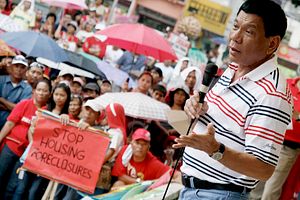Philippine President Rodrigo Duterte is no stranger to controversy, and his current government has been under fire of late across a variety of issues, ranging from tax policy to its approach to China and the South China Sea. We saw yet another sign of this recently with a social media campaign criticizing Duterte’s anti-women and misogynist behavior.
The social media campaign, which mobilized popular support among women netizens and activists, used the hashtags #BabaeAko (I am a woman) and #LalabanAko (I will fight back) while encouraging women to post videos countering the anti-women remarks of the president.
There is no doubt that there are grounds for complaints on this score. Duterte is accused of promoting discrimination and violence against women by using rape jokes in his speeches, directing his troops to shoot women rebels in their genitals, and dismissing the role of women leaders by vowing not to appoint a woman chief justice to the Supreme Court.
Duterte also stirred a public debate when he kissed a married woman supporter during his state visit to South Korea early this month. This incident outraged many people, especially advocates of women’s rights. It inspired the organizers of the #BabaeAko campaign to call for unity among Filipino women in challenging the sexist behavior of Duterte.
The campaign inevitably tackled Duterte’s seeming harshness in responding to his women critics. He jailed Senator Leila de Lima, a vocal critic and member of the opposition; he ordered the deportation of an Australian nun, who had been staying in the country for 27 years as a missionary working with farmers and the urban poor; and he supported the removal of Chief Justice Maria Lourdes Sereno, who had been expressing concern about the country’s human rights situation.
“The President through his pronouncement and attacks on women critical of his rule has reinforced misogyny and has set back the gains we have made in advancing women’s equality in the country,” said Judy Taguiwalo, a former member of Duterte’s Cabinet.
Journalist Inday Espina-Varona thinks Duterte’s behavior is proof that he is intimidated by women.
“He appears contemptuous, but it’s really fear. He feels women have thwarted his desires as president, resisted his autocratic ways. Whether its media, or the judiciary or the legislature, or the executive, he’s found that women won’t play his games, or engage in the backroom deals that seem to be the trademark of his government,” Varona told Al Jazeera.
#BabaeAko supporters also discussed how Duterte’s controversial programs are hurting women, such as the bloody anti-drug operations of the police, the displacement of indigenous peoples in militarized areas of Mindanao, and the imposition of higher taxes on consumer goods early this year. According to critics, Duterte is guilty of spewing out hateful remarks against women and enacting policies that worsen the conditions of the poor.
#BabaeAko could also add its voice to groups protesting the removal of a comfort woman statue in Manila after the Japanese embassy informed the Duterte government about its existence. To the great dismay of women’s groups, Duterte publicly backed the removal of the statue, even if the sculptor has already clarified that it was not a symbol of protest but a mere appeal to remember history.
Reacting to the widespread reach of the #BabaeAko campaign, Duterte’s aide insisted that the president supports the empowerment of women and cited the passage of a Women Code when he was mayor of Davao City. He also dismissed the allegations against Duterte as politically instigated. The president’s spokesperson said Duterte’s controversial remarks about women were a mere “play of words” and they only reflect his “growing frustration over the continuous and non-stop tirades against his administration by the ousted chief justice.”
#BabaeAko echoes the global #MeToo movement, which inspired women to share their stories of sexual abuse and express solidarity with others who also experienced the same violence. Like #MeToo, the Philippines’ #BabaeAko provided a space for women to speak out against abuse and hate perpetrated by powerful men in society. But unlike #MeToo, #BabaeAko is directly political since it focuses on the president, who remains unapologetic up to this day. #BabaeAko also clearly and immediately identified what it wanted to challenge: Duterte’s sexism and his anti-women policies. It is an indictment of Duterte’s failure to enact an inclusive social reform agenda.
As Duterte marks his second year in office, his government is besieged by criticisms, which became more frequent, louder, and stronger in recent months. Duterte is unfazed by these criticisms and even tried to antagonize more groups resisting his policies. But what the #BabaeAko campaign showed is the readiness of ordinary citizens to take up a cause and join others in expressing their sentiments — even if this means publicly fighting a leader known for using brutal methods in dealing with his critics.
































